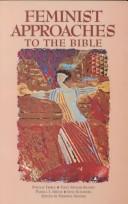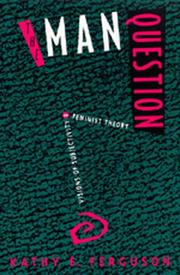| Listing 1 - 10 of 782 | << page >> |
Sort by
|
Book
ISBN: 1613769857 Year: 1988 Publisher: Wahroonga : University of Massachusetts Press,
Abstract | Keywords | Export | Availability | Bookmark
 Loading...
Loading...Choose an application
- Reference Manager
- EndNote
- RefWorks (Direct export to RefWorks)
The text is arranged in a pattern that mirrors Grumet's argument that women who teach make this passage between the so-called public and private worlds daily and that is also what we teach children to do. The chapters go back and forth between the experience of domesticity and the experience of teaching, between being with one's own children and being with the children of others, between being the child of one's own mother and the teacher of another mother's child, between feeling and form, family and colleagues. The first and last chapters address the familial relations that fall under the category of reproduction, a frame designed to emphasize the relations of reproduction and their importance to educational theory. The chapters closest to this margin are those that address women's work in schools, and the juxtaposition is chosen to accentuate the dialectical relation of our public and private meanings. The middle chapters are the ones most directly concerned with curriculum, that provisional ground that Grumet is naming as our mediating space, the place where we can heal. The fundamental argument of this text is that knowledge evolves in human relationships.
Book
ISBN: 0884141845 0884141853 1628371528 9781628371529 9780884141853 9780884141846 Year: 2016 Publisher: Atlanta
Abstract | Keywords | Export | Availability | Bookmark
 Loading...
Loading...Choose an application
- Reference Manager
- EndNote
- RefWorks (Direct export to RefWorks)
"Womanist Biblical Interpretation: Expanding the Discourse brings together cross-generational and cross-cultural readings of the Bible and other sacred sources by including scholars from the Caribbean, India, and Africa who have not traditionally fit into the narrow U.S., African American paradigm for understanding womanist biblical interpretation. The volume engages the reader in a wide range of interdisciplinary methods and perspectives, such as gender and feminist criticism, social-scientific methods, post-colonial and psychoanalytical theory that emphasize the inherently intersectional dynamics of race, ethnicity, and class at work in womanist thought and analysis"--
Book
ISBN: 9789811914263 Year: 2022 Publisher: Singapore Springer Nature Singapore :Imprint: Springer
Abstract | Keywords | Export | Availability | Bookmark
 Loading...
Loading...Choose an application
- Reference Manager
- EndNote
- RefWorks (Direct export to RefWorks)
Book
ISBN: 3890856578 Year: 1992 Publisher: Pfaffenweiler : Centaurus-Verlagsgesellschaft,
Abstract | Keywords | Export | Availability | Bookmark
 Loading...
Loading...Choose an application
- Reference Manager
- EndNote
- RefWorks (Direct export to RefWorks)
Book
ISBN: 9781138053427 Year: 2018 Publisher: Abingdon, Oxon ; New York, New York : Routledge, Taylor & Francis Group,
Abstract | Keywords | Export | Availability | Bookmark
 Loading...
Loading...Choose an application
- Reference Manager
- EndNote
- RefWorks (Direct export to RefWorks)
This book provides a historical context for understanding the contested relationships between women and nature, and it articulates strategies for moving beyond the dualistic theories and practices that often frame those relationships. In 1974, Francoise d'Eaubonne coined the term "ecofeminism" to raise awareness about interconnections between women's oppression and nature's domination in an attempt to liberate women and nature from subordination. Since then, ecofeminism has attracted scholars and activists from various disciplines and positions to assess the relationship between the cultural human and the natural nonhuman through gender reconsiderations. The contributors to this volume present critical and constructive perspectives on ecofeminism throughout its history, from the beginnings of ecofeminism in the 1970s through to contemporary and emerging developments in the field, drawing on animal studies, postcolonialism, film studies, transgender studies, and political ecology. This interdisciplinary and international collection of essays demonstrates the ongoing relevance of ecofeminism as a way of understanding and responding to the complex interactions between genders, bodies, and the natural environment. It will be of great interest to students and scholars of ecofeminism as well as those involved in environmental studies and gender studies more broadly.
Book
Year: 2015 Publisher: London Repeater Books
Abstract | Keywords | Export | Availability | Bookmark
 Loading...
Loading...Choose an application
- Reference Manager
- EndNote
- RefWorks (Direct export to RefWorks)
Feminism --- Feminist criticism --- Book

ISBN: 1880317419 Year: 1995 Publisher: Washington, D.C. : Biblical Archaeology Society,
Abstract | Keywords | Export | Availability | Bookmark
 Loading...
Loading...Choose an application
- Reference Manager
- EndNote
- RefWorks (Direct export to RefWorks)
Bible --- Feminist criticism --- Congresses.
Book
ISBN: 2753590982 Year: 2020 Publisher: Paris : Presses universitaires de Rennes,
Abstract | Keywords | Export | Availability | Bookmark
 Loading...
Loading...Choose an application
- Reference Manager
- EndNote
- RefWorks (Direct export to RefWorks)
"Qu'est-ce que "se réorienter dans la pensée", se demande Michèle Le Doeuff ? C'est "s'apercevoir qu'on est en train de se promener quelque part avec une carte qui n'est pas la bonne parce qu'on n'a pas pris en compte où l'on était". L'Étude et le Rouet (1989) est le récit d'un tel geste, à savoir reconnaître qu'en condamnant les femmes à n'être qu'un simple objet de réflexion, voire en les excluant de son champ, la philosophie "échoue à tenir sa promesse fondamentale de constituer une rationalité-en-commun". Alors que la réflexion sur la sexualité et le genre s'est trouvée parasitée par les polémiques nées des débats sur le "Mariage pour tous" (2013), il est essentiel de revenir sur certaines des étapes ayant scandé l'histoire de la pensée féministe en France ces dernières années : l'ceuvre de Michèle Le Dceuff constitue l'une de ces étapes. Son réexamen s'inscrit dans la possible généalogie d'une voie française vers les études sur les sexualités et le genre."--Page 4 of cover.

ISBN: 0520079914 Year: 1993 Publisher: Berkeley University of California press
Abstract | Keywords | Export | Availability | Bookmark
 Loading...
Loading...Choose an application
- Reference Manager
- EndNote
- RefWorks (Direct export to RefWorks)
Book
ISBN: 9780567656018 0567656012 9780567656001 9780567656025 9780567656032 Year: 2015 Publisher: London Bloomsbury T&T Clark
Abstract | Keywords | Export | Availability | Bookmark
 Loading...
Loading...Choose an application
- Reference Manager
- EndNote
- RefWorks (Direct export to RefWorks)
| Listing 1 - 10 of 782 | << page >> |
Sort by
|

 Search
Search Feedback
Feedback About UniCat
About UniCat  Help
Help News
News